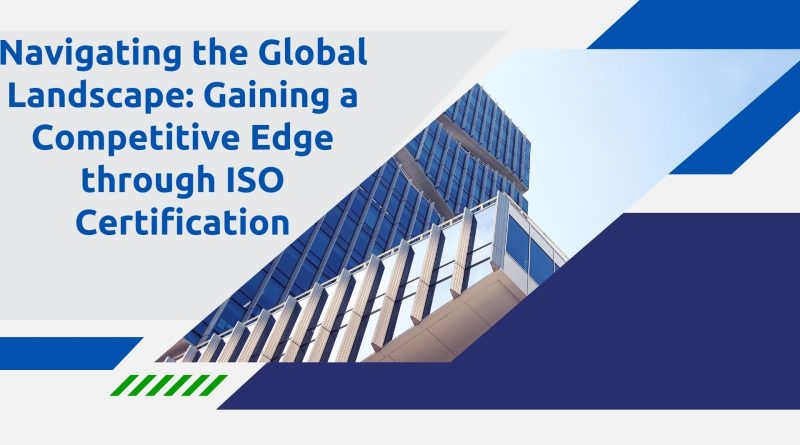Gaining a Competitive Edge through ISO Certification
In today’s interconnected and highly competitive global marketplace, businesses are constantly seeking ways to distinguish themselves and gain a competitive edge. One effective strategy that has gained prominence is obtaining International Organization for Standardization (ISO) certification. This accreditation not only demonstrates a commitment to quality and excellence but also opens doors to new opportunities in the global business arena.
Understanding ISO Certification
ISO certification is a testament to a company’s adherence to international standards, ensuring that its products and services consistently meet customer expectations. The ISO framework encompasses various standards. Each addressing specific aspects of business operations, including quality management, environmental sustainability, information security, and more. Achieving ISO certification requires rigorous adherence to these standards, reflecting a company’s dedication to best practices and continuous improvement.
The Global Imperative
As businesses expand their reach beyond national borders, the need for a universally recognized standard becomes crucial. ISO certification provides a common language for businesses worldwide, facilitating seamless collaboration and trade. In a global marketplace, where consumers and partners demand transparency and reliability, ISO certification serves as a mark of trust and quality.
Enhancing Reputation and Building Trust
ISO certification is not merely a checkbox on a compliance list; it is a powerful tool for enhancing a company’s reputation. Customers and partners are more likely to engage with businesses that have demonstrated a commitment to quality and reliability through ISO certification. This, in turn, builds trust, fostering long-term relationships and enhancing the brand’s credibility on the global stage.
Meeting Regulatory Requirements
In an era of increasing regulatory scrutiny, ISO certification can be a game-changer. Many industries and jurisdictions require adherence to specific standards, and obtaining ISO certification ensures compliance with these regulations. This proactive approach not only mitigates legal risks but also positions the company as a responsible and ethical player in the global market.
Operational Efficiency and Cost Savings
ISO certification encourages the adoption of efficient and standardized processes within an organization. This not only improves overall operational efficiency but also reduces waste and errors. As a result, companies experience cost savings and increased profitability. In a global marketplace where margins can be tight, these operational improvements contribute significantly to gaining a competitive edge.
Accessing New Markets
ISO certification is often a prerequisite for entering new markets. Many multinational corporations and government agencies require suppliers and partners to be ISO certified. By obtaining this accreditation, businesses can unlock doors to new opportunities and collaborations on a global scale, expanding their market presence and revenue streams.
Continuous Improvement and Adaptability
ISO standards are designed to be dynamic, evolving alongside technological advancements and changes in the business environment. By committing to ISO certification, companies signal their dedication to continuous improvement and adaptability. This proactive approach ensures that businesses stay ahead of the curve, positioning themselves as leaders in an ever-changing global marketplace.
Strategic Planning for ISO Implementation
Obtaining ISO certification is not a one-size-fits-all process. It requires a strategic and tailored approach to align with the unique characteristics and goals of each organization. Successful implementation begins with a thorough understanding of the specific ISO standard(s) relevant to the business. A comprehensive gap analysis is conducted to identify areas that need improvement, setting the stage for a targeted and efficient certification process.
Employee Engagement and Training
ISO certification is not solely an initiative for the quality assurance or compliance team. It involves the entire organization, requiring a culture of quality that permeates every level. Employee engagement is critical, as individuals at all levels must understand the importance of their roles in maintaining and improving quality standards. Training programs are instrumental in ensuring that employees are not only aware of ISO requirements but also equipped with the necessary skills to implement them effectively.
Documentation and Process Standardization
A key aspect of ISO certification is the creation and maintenance of comprehensive documentation. This includes quality manuals, procedures, work instructions, and records that demonstrate compliance with ISO standards. Standardizing processes across the organization ensures consistency and repeatability, key elements in achieving and maintaining ISO certification. Robust documentation not only facilitates the certification process but also serves as a valuable resource for ongoing improvement efforts.
Internal Audits and Continuous Improvement
Internal audits are a crucial component of the ISO certification journey. Regular and systematic assessments help organizations identify areas for improvement and ensure ongoing compliance with ISO standards. These audits serve as a proactive measure to address issues before external certification audits. The continuous improvement cycle, often referred to as the Plan-Do-Check-Act (PDCA) cycle, becomes ingrained in the organizational culture, fostering a mindset of perpetual enhancement.
Building a Resilient Supply Chain
ISO certifications extends beyond the boundaries of a single organization and encompasses the entire supply chain. Collaborating with suppliers and partners to ensure they meet ISO standards enhances the overall resilience of the supply chain. This not only mitigates risks but also contributes to the reputation and credibility of the entire business ecosystem. A certified and robust supply chain is a strategic asset in the competitive global marketplace.
Leveraging Technology for ISO Compliance
In the digital age, technology plays a pivotal role in achieving and sustaining ISO certification. Implementing integrated quality management systems and software solutions can streamline processes, enhance transparency, and facilitate real-time monitoring of key performance indicators. Embracing technology not only makes ISO compliance more manageable but also positions the organization as forward-thinking and adaptable in the face of technological advancements.
Conclusion
In a world where competition knows no borders, ISO certification is more than a badge of honor; it is a strategic imperative. Businesses that embrace this commitment to quality, efficiency, and adaptability gain a competitive edge in the global marketplace. As the demand for transparency and reliability continues to grow, ISO certification becomes not only a differentiator but a key driver for success in the interconnected and dynamic world of international business.

